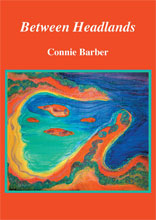 Between Headlands by Connie Barber
Between Headlands by Connie Barber
Five Islands Press, 2006
According to AUSTLIT: The Australian Literature Resource, Connie Barber's fourth collection of poetry, Between Headlands, has only been reviewed on one occasion by any print or on-line journal in this country since its publication. I am surprised by this lack, as I believe Barber has an established writing career and a public presence. Barber deserves a greater critical reception than she currently enjoys, and hopefully this substantial book will further establish her already published oeuvre.
Between Headlands is an elegantly-produced collection of poems. The book is divided into five subject groups: 'The Great Ocean and The Sea', 'Opposition and Openings', 'Those Mysterious Invasions', 'No More People' and 'Passages'. The poems represent matters philosophical, linguistic and elemental and include sonnets and less formal prose poems.
The front cover features a painting, 'American Bay, Kangaroo Island', by the author, announcing her interest and fascination with the world of nature. Some of the poems contrast ecological observation and individuals resisting or conversing with the land. In 'Westernport', for example:
The suit and tie, slightly overfed,
sedentary, shabby in a satisfied
suburban way
This 'suburban way' ignores or resists an appreciation of 'sea grass beds, [and] nurseries for fish'. The male narrator from the city is closed off to the elemental rhythms of the ocean, disavowing the significance of 'lamp shells breeding as they did in/Cambrian, Silurian, [and] Devonian years'. '[B]ehind his foolproof door', he does not think much of these ancient breeding grounds, these signs of fecundity. Changing seasons is a concern of much of Barber's poetry, as can also be seen in 'In Silence':
The paddock's ripe heads
turn gold to shimmer silver.
Spring's green
fades into gritty earth.
The seasons move inexorably on, summer replacing spring. The simplicity and conciseness of these evocative images show the primal rhythms of the seasons, the constant change revealing the secrets of transfiguration: regeneration becomes decay becomes regeneration.
Barber is drawn to movement, to the pulses exploring the patterns in the luminal zones between elements such as day and night, the ocean and the shore. Poems such as 'The Edge of the Land' and 'The Flatlands and The Sea' explore these zones effectively. 'Edge' describes the action of a storm in a beautiful, luminous language, with similes like 'the wind,/cold and sharp as hail' and the shimmering simplicity of the words describing the paths of energy around and through 'the world's flow'. The 'flow' of the ocean creates 'new land' by 'leave[ing] samplers: drowned birds,/shearwater's legs bluer than the sky, the delicate curve/ of the egret's golden bill'. The effects of the storm engender communication, and compel the narrator to 'whisper to the sea'. The awe that the 'people of the shoreline' experience reinforces the insignificance of humanity.
Many of these poems represent a life lived, a life in which the passing of the years and the tentativeness of relationships and experiences provide real intuition into the fragility of existence. In 'A Year Not Long Enough', a moving evocation exploring grief, th author ruminates:
a year since death cut
day's imperative to find time
to care to count moments.
Death breaks time, cutting across the daily patterns in an individual's life. Grief creates a different sense: time is cut-up, life is disordered. In this poem of three stanzas, the absence of punctuation constructs feelings of slowness, of rapidity, of upside-down events. It is as if death maligns time with the hands of the clock moving frenetically around the face: stopping, moving, stopping then moving again: 'It is forever time that does not count'.
The trope of temporality is a significant presence in these poems. In 'All Hallows Eve 31st October', the residual elements of Northern Hemisphere pagan/nature cultures migrate to the Southern Hemisphere: 'the old/hawthorn hedge, immigrant/from another hemisphere, a shabby memory/of early spring, the first cicadas'. This is the imposition of settler cultures in colonial countries like Australia. Boundaries dissolve, the seasons are reversed, summer in the Southern Hemisphere is winter in the Northern Hemisphere, the light and dark are turned upside-down: 'Slow dark and a changing moon allow entry/to an older darker honouring the soul's need'.
Connie Barber speaks from her heart, her lines echoing a redemptive power through effective similes, concise images and a powerful simplicity that has remained in the imagination of this reader. Five Islands Press must be praised for the publication of this fine collection of poetry.
Peter Mitchell writes poetry, short fiction and literary criticism and a range of journalism.









